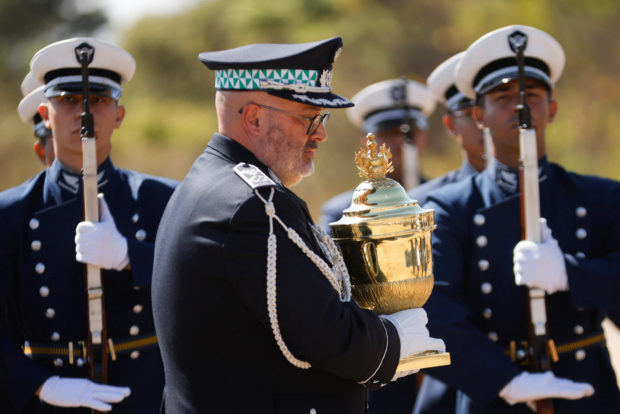
A man carries the heart of Portuguese monarch Dom Pedro I, who declared Brazil’s independence from Portugal 200 years ago and was named Emperor of Brazil, during a welcome ceremony at the Brasilia Air Base, in Brasilia, Brazil August 22, 2022. REUTERS
BRASILIA — The heart of Portuguese monarch Dom Pedro I, who declared Brazilian independence from Portugal 200 years ago and was named “emperor” of Brazil, arrived from Portugal on Monday and will be put on display as part of independence anniversary celebrations.
The heart has been kept in an urn with formaldehyde in the Portuguese city of Porto since Pedro’s death in 1834 in Portugal at the age of 35.
The Portuguese government agreed to loan the heart to Brazil for three weeks for the bicentennial celebration. The Brazilian air force flew it to Brasilia, where it was received on Monday by the country’s defense minister.
A man carries the heart of Portuguese monarch Dom Pedro I, who declared Brazil’s independence from Portugal 200 years ago and was named Emperor of Brazil, during a welcome ceremony at the Brasilia Air Base, in Brasilia, Brazil August 22, 2022. REUTERS/Adriano Machado
Far-right President Jair Bolsonaro will receive the relic on Tuesday at the presidential palace with military honors and a gun salute, before putting it on public display at the Foreign Ministry through Brazil’s Independence Day on Sept. 7.
Pedro’s declaration of independence from Portugal, which is acclaimed by Brazilian nationalists as the birth of their country, was an act of defiance against his father, Portuguese King Joao VI.
The Portuguese king’s family was escorted to safety in Brazil by the British Navy in 1807 before Napoleon’s forces invaded Portugal. On returning to Lisbon in 1821, he left his son Pedro as prince regent of Brazil.
Pedro’s heart was separated in 1834 and kept in a church in Porto according to this last wishes. His remains were donated to Brazil in 1972 for the 150th commemoration of Brazilian independence and are kept in a museum in Sao Paulo.
RELATED STORIES
Brazil tourism sector tries to rise from pandemic ashes
Brazilian player gets life ban from tennis for match-fixing
Brazil health officials await test results to confirm first monkeypox case
Brazilian man bites fellow passenger, dies on Irish aircraft